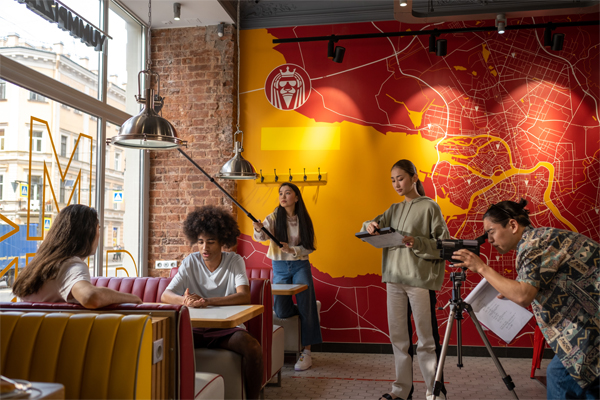Upholding values of diversity, inclusivity, representation and respect have never been more important for global brands, revealed findings from a new study.
Diversity in marketing is crucial to connect authentically with audiences worldwide, confirmed the latest findings from global creative platform Shutterstock. Big brands are also battling to “marry representation with authenticity”, confirmed its DE&I in Marketing: A Global Report. The research explores the views of thousands of marketers in Australia, Brazil, France, Germany, Italy, South Korea, Spain, the UK and USA on their use of diverse content in marketing campaigns; and how global events have impacted decisions.
Globally, the rise of awareness surrounding the Black Lives Matter and Stop Asian Hate movements last year drove brands to launch and develop existing anti-racism pledges. Nearly two-thirds of global marketers (63%) stated that these movements significantly impacted content decisions over the last 12 months, with 77% of global marketers saying they are expected to use more diverse representation in their campaigns.
In fact, 73% Australian and 61% US marketers agree that the Black Lives Matter and Stop Asian Hate movements significantly impacted content decisions in the past year. Brazil leads in terms of highlighting race as a major component of their marketing campaigns; with 76% of marketers agreeing that racial and ethnic diversity is an important factor. In terms of action, nearly a quarter of all respondents reported using more ethnically diverse models in their campaigns, ranging from Spain at 30% to Germany at 22%.
AUTHENTIC REPRESENTATION OF AGE DIVERSITY
It’s also important to showcase older generations, who often get overlooked, noted the report. In every country surveyed, over half of the respondents agreed that representing older generations mattered to them in their marketing materials; with Brazil leading the way at 69%. However, for the most part, less than a fifth of their campaigns have featured models over the age of 50 – on average. Around 31% of marketers in Australia and 17% in the US say have used more visuals of 50+ models in the last year.

People with disabilities also want to have their stories told in ways that both empower them and normalise their identities, revealed the report. Australia, representing the highest response rate of all survey groups, has said that up to 27% of its marketers report using more visuals depicting this group over the past 12 months; followed by Italy, with 21% stating they’ve included people with disabilities in their marketing campaigns.
BRAND REPUTATION
Events over the last year have encouraged more than a third (34%) of global marketers to believe that accurately representing the world we live in is the most important objective for content used in marketing campaigns. There is more of a desire for brands to effectively represent the world we live in over what their brand’s purpose is (34% versus 33%). However, as consumers look to engage with authentic brands, “marketers must understand how to ensure marketing is aligned with their core beliefs and values, or risk being seen as disingenuous”, highlighted the report.
Marketers state accurate representation is the top reason behind increasing their usage of content that features same sex couples (64%), racially diverse models (68%), people with disabilities (60%), and transgender models (62%). Additionally, 65% of marketers agree racial and ethnic diversity is an important factor when targeting campaign audiences. It is reassuring that 75% of marketers understand the importance of this content being created authentically by the same audience it intends to reach.

However, although 74% of marketers globally state using more diverse content helps a brand’s reputation, the results also show that 44% of those surveyed believe it can be difficult to reflect their brand with racial and ethnic diversity visually; and 76% globally say there is still room for growth. Interestingly, less than a third (31%) of Head of DE&I hires globally are involved in all marketing decisions, with 14% having no involvement at all; instead only supporting the HR function.
VISUALS REFLECTING GLOBAL DIVERSITY
“Our DE&I in Marketing study encompasses the events of the last year and a half; and how these monumental moments have impacted how diversity is valued and prioritised in brand content decisions,” said Meeckel Beecher, Global Head of Diversity, Equity and Inclusion at Shutterstock. “Despite the widespread lockdowns, content creation excelled, and the resilience of creativity has prevailed. There is no denying the world’s media has paid more attention than ever before to cultural movements and raising much-needed awareness. However, we wanted to understand to what extent this has been truly mirrored in content choices.”
Upholding values of diversity, inclusivity, representation and respect have “never been more important, or more urgent”, added Beecher. “Launching this Global Diversity Awareness Month, our report highlights that there is more work to be done, and we’re looking forward to collaborating with our partners to do the work. It’s positive to note that people are listening, and our mission at Shutterstock continues to be ensuring all creative content represents the diverse global community.”
OTHER KEY FINDINGS
Global brands are more focused on presenting their own ideology through their marketing decisions rather than representing the political landscape, according to the study. Just under half (41%) of global respondents said they focus their efforts more specifically on their own company ideology, compared to just 32% who look to reflect the political landscape. More than a quarter (26%) aim for their campaign creative to oppose the political landscape, demonstrating the increasing rise of brands making their own stand to social issues, and establishing their own voice.
Given the current international travel restrictions in place, lockdown restrictions still have a monumental impact on marketing content creation. With borders closed and stay-at-home orders enacted in many places, 37% of global marketers say their ability to source diverse content has been significantly impacted due to travel restrictions. The knock-on effect on content creation is clear: a quarter of marketers (25%) state they have been unable to localise content for individual markets. This has pushed more than one in six (17%) global marketers to violate lockdown restrictions – risking health and legal implications – to continue to create diverse content.
Click here to download the report.







































